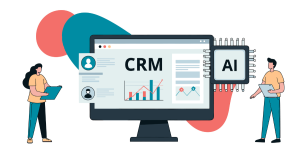It probably won’t surprise you to learn that customer relationship management (CRM) software and marketing automation software are VERY different from one another. Yet, it seems that many marketers still ask the question: can I use one of these to do the job of the other?
On the surface, each one can appear to be somewhat similar, but a closer look shows that each platform serves a very different purpose. Since it’s so important that sales and marketing teams understand the differences between the two systems, let’s examine the functionality and intended audiences for both CRM and marketing automation platforms, and see why they aren’t so interchangeable.
What’s the key difference between CRM and Marketing Automation?
Generally speaking, CRM software is sales-focused, while marketing automation software is, you guessed it, marketing-focused. Typically the sales team does the CRM buying and the marketing team does the marketing automation software buying—but there’s an important distinction here that’s important for marketers to remember: a CRM is more valuable to you than your marketing automation platform is to the sales team (or at least, that’s their perception).
Realistically, the two platforms should work well together, and that means the sales and marketing team should make buying decisions together. If you need guidance on how to approach CRM from a marketer’s perspective, start here.
The Ultimate Strategy Guide to Microsoft Dynamics and Marketing Automation
Learn how to integrate dynamics with your email, social, & more
The Purpose of Marketing Automation Software
Marketing automation software helps marketers offload repetitive marketing tasks, like scheduling and tracking marketing activities, launching email campaigns and mass B2B or B2C communications, or creating dynamic follow up messages to new leads or existing clients. Most marketing automation systems also allow you to track activities that indicate levels of interest from potential prospects, including website visits, email openings, and content or form downloads.
Marketing automation software gives you the ability to segment prospects (or customers) into appropriate emailing lists based on customizable criteria that best fit your business goals. It can also give you powerful lead-nurturing functionality, including the ability to deliver triggered emails at exactly the right time in the customer journey. Or you can schedule “drip” email campaigns to keep your company visible throughout the nurturing process.
This system also gives you powerful analytical tools that shows you what worked and what didn’t after a campaign has ended. This helps organizations fine-tune their strategy for future campaigns, leading to better sales results over the long run. In a nutshell, marketing automation platforms give you powerful tools that foster leads, preparing them to be delivered to your sales team. As a lead progresses through the funnel and transforms into qualified sales leads, it’s usually time to start tracking them in a CRM.
The Purpose of CRM Software
CRM software is designed to store all kinds of contact information about leads (and customers) once they have been handed off to the sales team. This can include basic information, like names, companies, titles, and email addresses, but a CRM can also log data, like how long a person has been a customer, the dates and results of phone calls and other customer touchpoints, as well as past purchasing records, and records of emails sent from sales or the customer service team—all of which is PRIME for building targeted lists in your marketing automation platform.
CRM systems usually have the capability to send alerts to sales personnel for things like scheduled calls with clients, updates on order processing, and when a client’s birthday is coming up. All of this helps the sales team understand as much as possible about a prospect or existing customer, allowing them to build personal relationships that deliver results over time. If you have an integration to a marketing automation platform, that data often shows up in a CRM lead or contact record as well.
Sales teams utilize CRM data to help them organize and optimize direct interactions between the company and their customers to maintain existing relationships that lead to increased sales and customer satisfaction. Since a CRM system allows the sales team to have visibility into where a potential customer is in the sales process, it helps them identify the most likely buyers, leading to more sales.
With that said, the CRM is an important tool for marketers as well—you should have control over what marketing campaigns are entered and how they are entered by the sales team so that you have good data on where your business’ leads are coming from.
Do You Need a CRM or a Marketing Automation Platform or Both?
If your organization is of the right size and mature in sales in marketing strategy, then yes, you need both.
While the marketing automation system feeds data into the CRM system, it’s these systems’ users and target audiences that make it necessary for both to perform separate tasks. It isn’t the norm for the sales team to have visibility and access into a company’s marketing automation system, but it is necessary for marketers to have visibility and access to the company’s CRM.
And while ideally the two systems should be integrated to work together, it helps to have a clear understanding of the differences between the two platforms. What matters most in the end is the quality of the leads that go from the marketing automation platform to the sales team and their CRM system. Knowing how to get the most out of both systems leads to greater sales success down the road.
Ready to get started?


